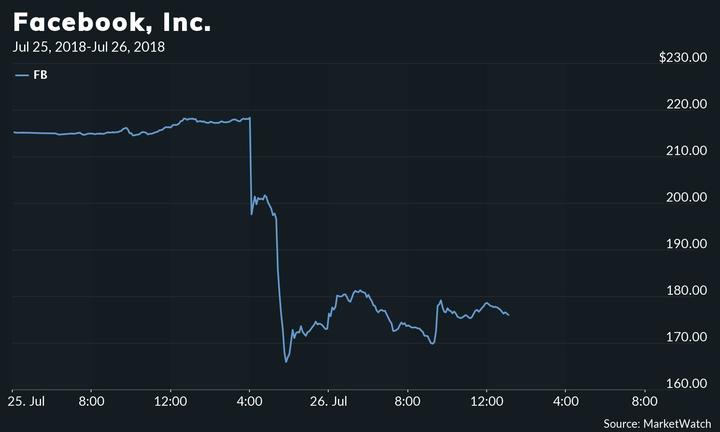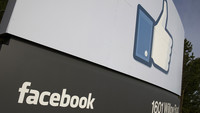Facebook stock drops roughly 20%, loses $120 billion in value after warning that revenue growth will take a hit
On Thursday, Facebook FB, +1.96% lost about $120 billion in market capitalization, after its earnings report after the market close on Wednesday missed expectations on revenue and showed slowing user growth. Weak guidance also rattled investors.
The stock closed down 19% Thursday to $176.26, which means that investors erased the entirety of the company’s 2018 gains. Its market capitalization as of Wednesday: $630 billion. By the end of trading Thursday, it was worth $510 billion after close and 170 million shares had changed hands. Facebook’s Thursday was the ugliest single-session decline since the company went public in 2012.
The social-media behemoth’s stock lost roughly one-fifth of its value in the extended session Wednesday. The stock dropped about 7% immediately after the earnings report was released, then plummeted to a loss of more than 20% as a conference call with analysts progressed. Close to 34 million shares changed hands in Wednesday’s extended session, well above the average volume of 17 million shares for a regular trading session over the past month.

Facebook stock had recovered from a decline earlier this year in the wake of the Cambridge Analytica scandal, one of several controversies and warning signs that the company had managed to weather with little damage to its stock. But declining revenue and user growth, topped by a warning from executives that it will continue, seemed to end that run.
“The guidance, it’s nightmare guidance,” GBH Insights head of technology research Daniel Ives said. “If you look at their forecast for the second half of the year in terms of user growth, and the expense profile, it refuels the fundamental worries about Facebook post-Cambridge Analytica.”
The Menlo Park, Calif.-based company reported $5.12 billion in net income for the quarter, which amounts to $1.74 a share, up from $3.89 billion or $1.32 a share in the year-ago period. The bottom-line beat was above analysts’ average estimates of $1.71 a share.
Profits were not what rattled investors, though. Facebook recorded sales of $13.04 billion, a 41.9% increase from a year ago, but that was lower than analyst estimates and previous growth rates. User growth was flat in the U.S. and Canada, and declined in Europe from the previous quarter.
But the stock didn’t fall off a cliff until Chief Financial Officer David Wehner disclosed that the social-media giant expects the revenue-growth slowdown to continue.
“Our total revenue-growth rates will continue to decelerate in the second half of 2018, and we expect our revenue-growth rates to decline by high-single-digit percentages from prior quarters sequentially in both Q3 and Q4,” he said on the conference call. Wehner also said Facebook still expects expenses to grow 50% to 60% from last year.
In the past, founder and Chief Executive Mark Zuckerberg has said the company planned to hire 20,000 people to handle safety and security on its platforms in response to controversies such as use of Facebook to push fake news ahead of the 2016 U.S. election. The company disclosed that its head count has increased 47% to 30,275 since the year-earlier period, part of that outsize spending.
“As I’ve said on past calls, we’re investing so much in security that it will significantly impact our profitability,” Zuckerberg said. “We’re starting to see that this quarter.”
Even though Ives says that the quarter was far from disastrous — it was decent with a few rough patches — he expects investors to continue punishing the stock in the near-term.
“The quarter itself had geographic soft spots and disappointed the bulls,” Ives said. “There are a lot of natural headwinds [Facebook is] seeing, this is going to be one quarter that puts the stock in the penalty box for a while until they can prove that advertising tailwinds and user growth are back on the right track.”
Facebook’s numbers in Europe declined in large part due to the European Union’s General Data Protection Regulation, which went into effect during the quarter. Some analysts had speculated that GDPR might actually benefit giants such as Facebook and Alphabet because they would be able to implement the new requirements unlike smaller companies, but Zuckerberg and other executives said GDPR was the reason for Europe’s slowing user count. It dropped by 3 million daily users and 1 million monthly users since the first quarter.
“We did see a decline in monthly activities in Europe, down by about 1 million people as a result, and at the same time, it was encouraging to see the vast majority of people affirm that though want us to use context, including from websites this they visit, to make our ads more relevant and improve their overall product experience,” Zuckerberg said on the earnings call with analysts.
Chief Operating Officer Sheryl Sandberg said on the call that the GDPR has not affected the company’s top line.
The one saving grace for Facebook could be continued support from advertisers. Less subject to the quarterly demands of investors, advertisers aren’t yet seen as planning to ease back on Facebook budgets.
“There’s still unprecedented scale, the best ad tech in the industry,” said PMX Agency Facebook lead Jesse Math. “In the short term, Facebook is still viable. Really this quarter and this year it’s focused on a long-term strategy, everything they do is focused on making Facebook a place where users want to be. All the changes it’s been making to the platform, the algorithms, the tools advertisers use are for the long term.”
As Facebook stock plummeted Thursday, it also brought social-media rivals Twitter Inc. TWTR, +4.47% and Snapchat parent company Snap Inc. SNAP, +9.84% to the party. It initially sent Snap down in the single digits, though it rebounded and closed down 0.2% to $13.37 at the close. Twitter stock closed down 2.9% to $42.94. Facebook stock is now flat this year, as the S&P 500 index SPX, +1.86% has risen 5.5%.








No Stickers to Show